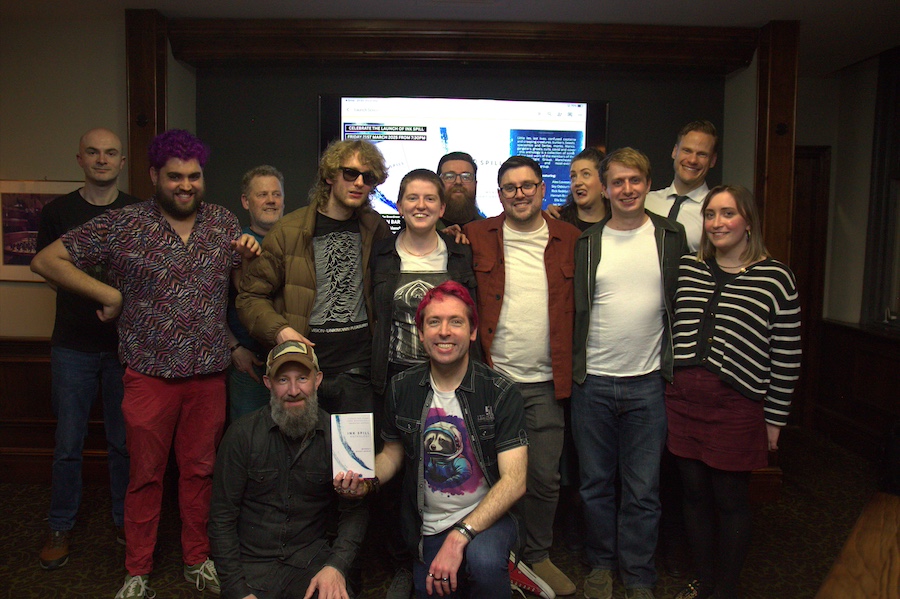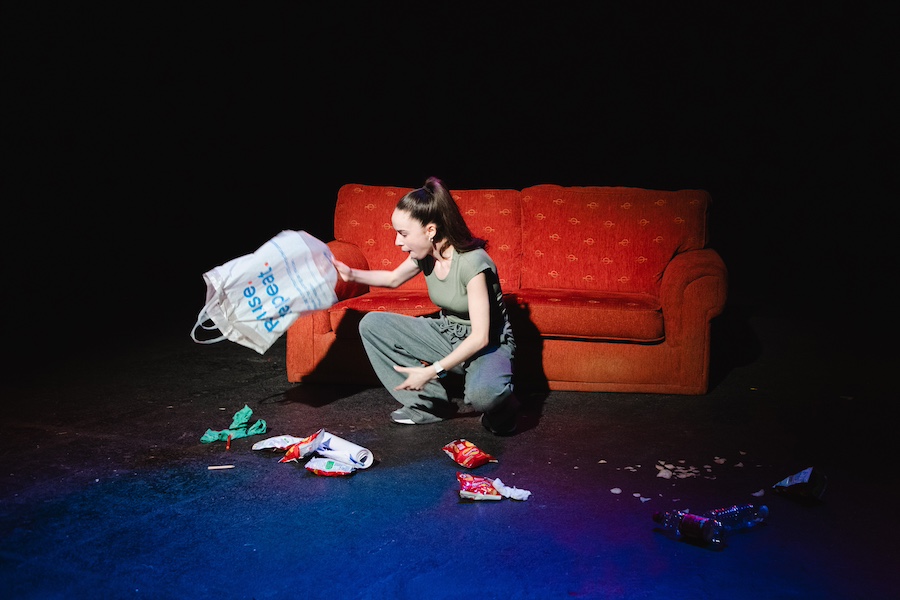Bee movie: why these Manchester cinema staff have trained to become beekeepers
- Written by Matthew Turner
- Last updated 5 years ago
- Cinema, City of Manchester, People
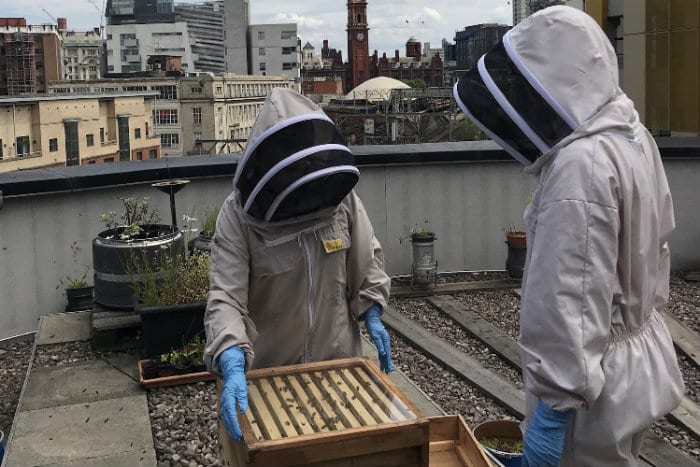
Up on the roof at arts centre HOME on First Street, there are two urban beehives. Named Aldrin and Lightyear following an audience vote, they’re part of an ongoing sustainability project that began several years ago.
We spoke to Alison Criddle, HOME’s projects and sustainability co-ordinator and one of four specially trained beekeepers, to find out more.
“I think the original idea came from people back at Cornerhouse – it must have been about 2014, while plans were still underway for building HOME,” she says.
“So when we came to HOME, we had the site up there risk-assessed and four of us went to be trained as beekeepers at Heaton Park at Manchester & District Beekeepers Association. We went through four weekends of training, and then I went to training every Monday night for a year.
“Last June we installed them. We’ve got two honeybee colonies, so there’s two hives up there. During the season, which is generally between spring and autumn, we go up and do weekly inspections.”
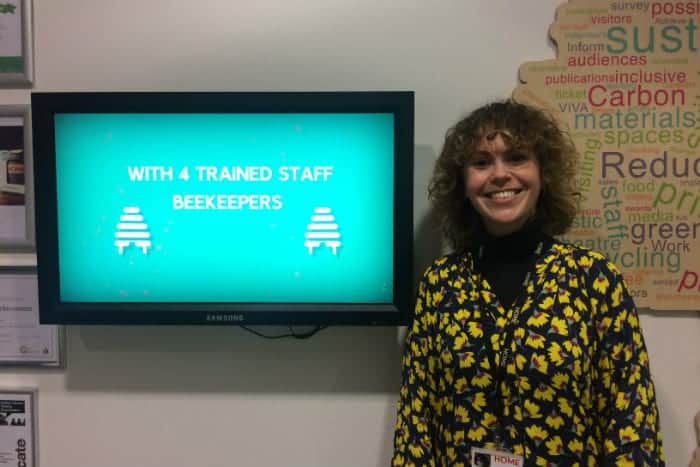
According to Alison, each inspection takes “a good hour and a half,” and that’s just the basic inspection.
“You’ll go through a checklist of certain things that you’re looking for. So you’re looking for the queen, or signs of the queen. She’s different from all the others, so it’s a little bit like playing Where’s Wally?
“And then you’re looking for signs of eggs and making sure the hive is looking healthy so there’s no unusual behaviours, making sure there’s not too much of one thing or not enough of another thing, making sure there’s enough food and so on.”
It’s also important to have two hives rather than just the one, Alison explains, so you can compare them.
“It was really very helpful in the first year – that was a real baptism of fire. You can go through all the training, but until you’re actually doing it hands on… It’s a massive learning curve, but it’s so exciting as well and they keep you on your toes.
“It’s really, really fascinating to watch them and to understand that kind of mentality of purpose and collaboration and teamwork.”
The honeybee hives have recently produced their first batch of honey, but Alison is keen to stress that that’s not their primary function.
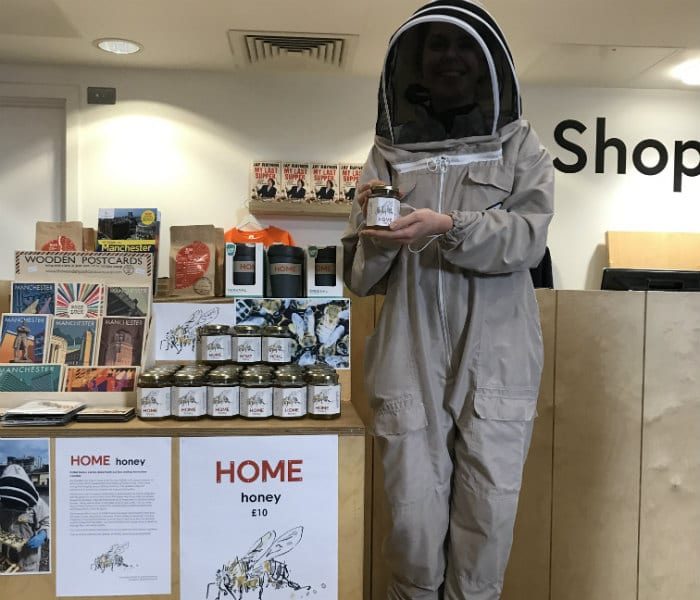
“This is the first year we’ve ever done it. We’ve created forty jars, because there’s a calculation you can do based on the amount of bees in the hive and the space and the amount of frames they’ve filled with honey, and to ensure they have enough to have food over winter. We’ve only taken the excess from that calculation, and that’s all we’ll ever do.
“This might be the only year we ever get honey, because they might never make that excess again; or it could be three times as much next year, we just don’t know.
“They’re very limited edition and they cost £10 each, with a limit of one jar per person. And all of that fund goes back into the environmental pot and to HOME’s charity, so it’s towards the upkeep of our bees and our sustainability.”
So what are the best and worst things about beekeeping?
“The best thing is, on a clear morning, being up there and you’re looking at the Manchester skyline and you’re holding up a frame of bees and you spot new brood, so there’s new eggs in there,” Alison says.
“One of the best things was opening the hives at the start of this year, knowing that they’d got through the winter.
“And then the worst thing is getting stung,” she continues. “I’ve only been stung twice so far, touch wood, but both times have been because I’ve not spotted it, so it was my own fault. They’ve got no reason to want to sting you because if they sting you, they’ll die.
“Maybe the worst thing is just knowing that they’re at risk, as a species. Which is part of a much bigger issue to do with ecosystems and looking after them.”
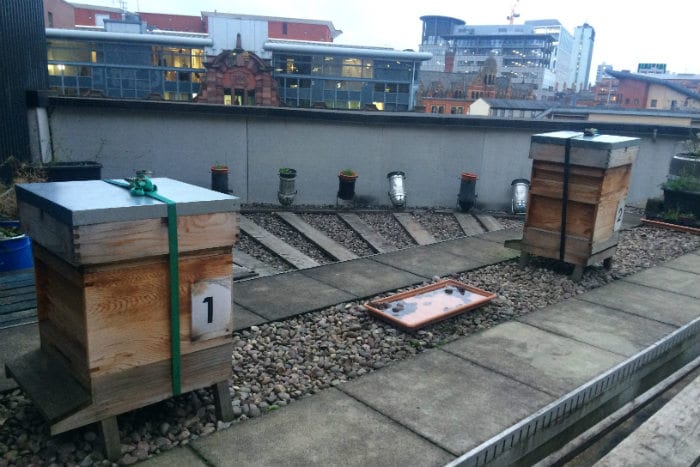
Beekeeping isn’t without its comedy moments either, as Alison recalls.
“The one time I did get a bee inside my bee suit was not a good day. Normally, we come down in our bee suits looking like Ghostbusters, and people ask how the bees are doing and want to know all about it.
“But one time I had a bee in my suit and I hadn’t noticed and it got out into the office, which doesn’t have any open windows. That was a lesson learned.”
Speaking of learning, Alison has picked up a number of fascinating bee facts since becoming an apiarist (the scientific term for beekeeping).
“The queen bee can lay up to 1,000 or 2,000 eggs a day, so she has quite a life,” she tells us.
“Bees will happily go up to three miles for forage – they’re not tagged (although that has been done by other people), but they come back with different coloured pollen on their legs, so you can see if they’ve been to other hives.”
In fact, Alison turns out to be a veritable hive of bee facts.
“I always love the idea of the waggle dance, where they come back to the hive and they communicate. Supposedly, the communication travels along the comb and the movements spell out different directions of where the best pollen is.
“Also, on average across a hive, a bee makes a 12th of a teaspoon of honey in its lifetime. So when we say that we’re selling the honey for £10, it’s because every single drop of that honey is gold and precious and has been made by a creature that has worked really hard.”
Of course, HOME isn’t the only venue in Manchester with urban beehives – something that Alison says has proved very useful.
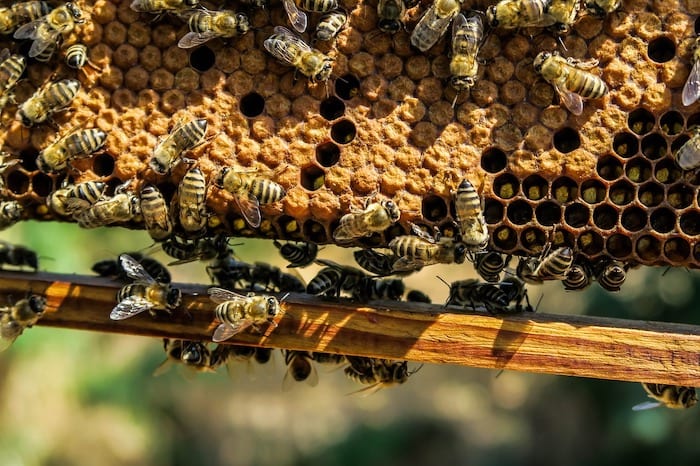
“When we were training, we visited some other urban hives. We went to Manchester Cathedral, where they have them up on the roof. I’d also done some work previously with Manchester Art Gallery’s beehives, which have since been relocated down to the chaplaincy on Oxford Road.
And we went to the Printworks, where they have hives, and they did have chickens up there one point.
“Bez is the patron of the Printworks, so we’ve got quite a nice little network now of urban bee-keepers in Manchester, and we can call on them. If we know somebody’s suddenly got a swarm of bees then we can help them out, or if someone else is looking for a queen.
“We can learn from each other. There doesn’t really seem to be any direct competition between them, because they’re nicely spaced out.”
When they’re not tending to the bees, the four beekeepers all have full-time jobs at HOME.
“One of them is one of our development managers, one is our box-office systems manager, one works for the BFI Film Academy, and I am projects and sustainability co-ordinator, so half of my role is environmental and half of it is projects.”
Alison is keen to point out that the bee-curious can check in on the bees via the public access webcam – although they’re hibernating for the moment, so don’t expect too much bee action.
Alison, who came to Manchester for university and never left, says she can’t imagine being anywhere else. Rather appropriate, since the city’s symbol is the worker bee.
“I’ve been in Manchester for about 12 years now. I’m only from Preston, but Manchester just feels like home. This city is of its people, isn’t it?
“I was going to say it’s got a bit of a buzz about it…”.
- This article was last updated 5 years ago.
- It was first published on 22 November 2019 and is subject to be updated from time to time. Please refresh or return to see the latest version.
Did we miss something? Let us know: press@ilovemanchester.com
Want to be the first to receive all the latest news stories, what’s on and events from the heart of Manchester? Sign up here.
Manchester is a successful city, but many people suffer. I Love Manchester helps raise awareness and funds to help improve the lives and prospects of people across Greater Manchester – and we can’t do it without your help. So please support us with what you can so we can continue to spread the love. Thank you in advance!
An email you’ll love. Subscribe to our newsletter to get the latest news stories delivered direct to your inbox.
Got a story worth sharing?
What’s the story? We are all ears when it comes to positive news and inspiring stories. You can send story ideas to press@ilovemanchester.com
While we can’t guarantee to publish everything, we will always consider any enquiry or idea that promotes:
- Independent new openings
- Human interest
- Not-for-profit organisations
- Community Interest Companies (CiCs) and projects
- Charities and charitable initiatives
- Affordability and offers saving people over 20%
For anything else, don’t hesitate to get in touch with us about advertorials (from £350+VAT) and advertising opportunities: advertise@ilovemanchester.com

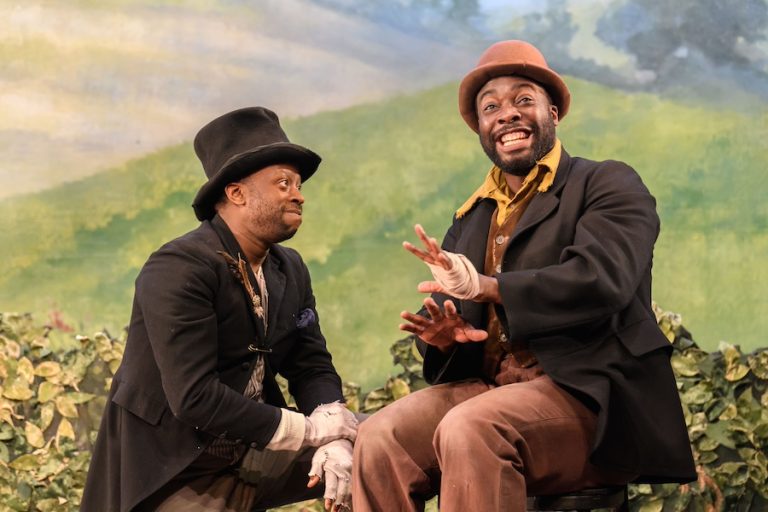
Review: Tambo & Bones at HOME is ‘ambitious, bold, gutsy…. and terrific’
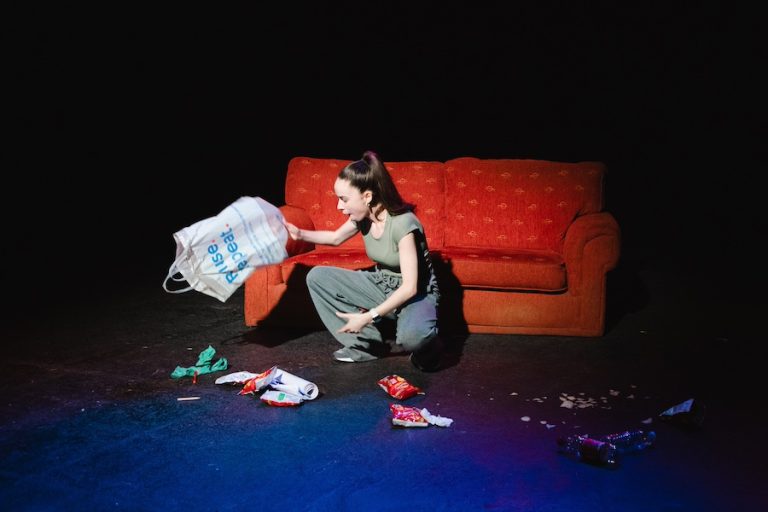
Review: JB Shorts 26 at 53two is ‘a five-star showcase of northern talent’









